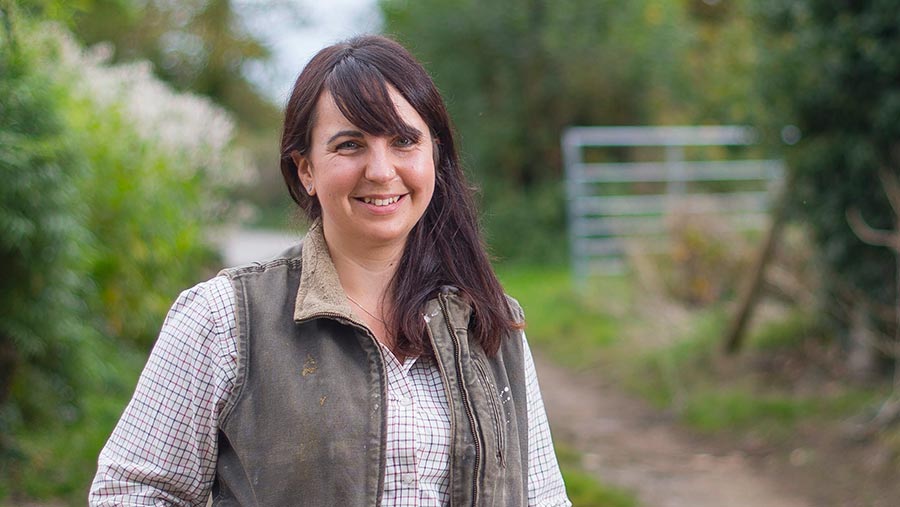Opinion: Let’s collaborate and communicate
 Jess Jeans © Jim Wileman
Jess Jeans © Jim Wileman Size matters. Ask any farmer how many acres, tractors or cows he or she has and the answer will have been rounded up.
There is great diversity within British agriculture, from small units operated part-time by one person, up to massive modern farming companies managing thousands of hectares.
Our diversity is what sets us apart from other industries and creates the wonderful variety of landscapes across the British Isles. Here, we definitely fit into the “small” category.
See also: This year I will Brexit-proof my farm
Lowland suckler cows are probably not the sector most people would invest in at the start of their farming career.
The returns are tight, overheads are scary and the livestock aren’t known for being co-operative colleagues.
Stubborn streak
We did it because we have a passion for breeding cows, a desire to manage the land sympathetically and a stubborn streak half a mile wide.
There is one resource that cannot be overestimated on small farms such as ours and that is the contribution of our wider family.
We might be the ones who earn a living from the farm, but our whole family has a stake in its success that cannot be remunerated in monetary terms.
We couldn’t operate without the contribution of labour and machinery from Will’s brother at busy times; he works for a much larger farming company and also runs his own small contracting firm using our yard as a base for his kit.
But at silage-time, he is often to be found in our fields helping with the wrapping or baling into the small hours or giving William a hand with the feeding on a Sunday morning so we can all make it to lunch on time.
The family is at the beating heart of so many farms, large and small. The industry is unique in the modern world where multinational conglomerates employing thousands of people make up the bulk of the economy.
Here on the land, things are organised differently. Farming creates a rich community that spans the landscape – families that have intermarried, farms that have expanded or been handed down.
Deals are done between farmers and through markets and word-of-mouth and, for the most modern folk, via social media.
Knowledge transfer
This knowledge transfer and business collaboration is going to have to play a much larger part in our future and the foundation for deeper cohesion is strong.
Links between farms are becoming ever more important with the sharing of resources developing strongly. Here for example, we own some of the silage equipment in conjunction with our neighbour which saves costs and means we can run bigger, more reliable kit and share the labour at silage time.
Despite our strong bonds of friendship with our farming neighbours, many farms – ours included – do still operate in something of a bubble, however.
We have little control over the markets that we sell into and, while all farms are different and each has its own unique set of challenges and costs of production, beyond the farm gate, beef is beef and grain is grain.
There is no way of creating a price distinction, despite the vast differences between producers large and small, intensive or extensive.
One farm might have a much higher cost of production because of the specific environment compared to another highly mechanised, intensive farm that can take advantage of economies of scale or cheap inputs.
Recent discussions around the marketing of free-range milk have highlighted just how easy it is to confuse the public and polarise an issue to the detriment of very good farmers producing a high-quality product.
Despite my frustration sometimes as I’m bedding up cattle with a pitchfork, trying to eke out the straw which costs a fortune down here in Cornwall or lamenting the fact that I just can’t justify the investment of a bale spreader, ultimately being a family farm has far more advantages than disadvantages. There is no other way I would want to spend my career.
None of us are in this business to get rich quick, but as the world is changing rapidly around us it is time we drew on the strength of our community to ensure that we can carve out a strong future for family farms.
Efficient
We need more formal ways of working together to build strong supply chains that give reliable and fair returns to farms of all sizes and new ways of working that can make all of us more efficient and sustainable.
It’s not good enough to have some farms at the cutting edge, able to take advantage of the most favourable opportunities, while some are left behind.
We need to work together to ensure the success of all farms, especially in regions where the small family farm predominates and there is less opportunity to expand or diversify away from core farming enterprises.
Living and working on the land is a privilege, but not many people could stick the stress and financial pressure that comes with farming to create the countryside that the British people cherish so much.
In future, it is going to be so important that we collaborate and communicate our values to ensure our survival.
Jess Jeans and her husband Will run 75 suckler cows on an 80ha National Trust farm on the Devon/Cornwall border. They have two children, Teddy and Lydia. Jess has a degree in rural business management and enjoys horse riding in her spare time

